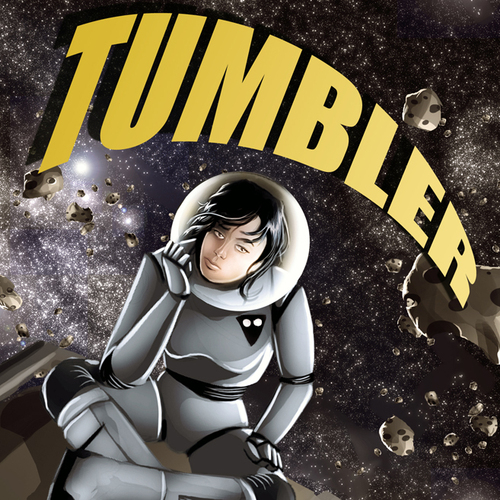Clerk’s Log, MJDate 55153.21: *ahem* As I was saying before I was so rudely interrupted …
Tales of space encounters abound in the annals of SFF literature, from the romances of Cyrano de Bergerac to H.G. Wells’s The First Men in the Moon to Bradbury’s S is for Space to Niven’s Ringworld stories and far beyond. Indeed, when one says “science fiction” the common response seems to be “Oh yeah, that Star Trek stuff.”1 Even though there’s much that we still don’t know about our own planet, it’s still too familiar, too well mapped to have any “HERE BE MONSTERS” sectors remaining; for the fast transport to wonder, therefore, we choose the Up-and-Out. Spacecraft ply the wormholes and warps and jumpgates and plain-vanilla-vacuum between the stars, finding strange and novel experiences — which, one hopes, enlighten our approach to life back in the mundane here-and-now.
What the storytellers don’t spend time on is the actual day-to-day business of making a living out there in the deep dark. It’s one thing to be the captain and tackle the challenges Out There. It’s another to be the working stiff who doesn’t have time for Out There because he or she has plenty to deal with to keep body and spirit together In Here. The brass can have the alien encounters and interstellar diplomacy Upstairs, but Downstairs among the support staff, where the everyday grunt work enables the Upstairs crew’s fancy toys and jaunts, where they’re as likely to play Merle Haggard as Mozart, life goes on.
Happily, authors have stepped up to give us the other side of the story. In the past we have had Heinlein’s Starman Jones and Farmer in the Sky. Today we have the Golden Age of the Solar Clipper and an opus entitled Tumbler. While differing astronomically (and this is one place we can use that term without hyperbole) in setting and execution, authors Lowell and Gamblin give us, along with some cracking good entertainment, two themes that prove useful right here and right now.
What shall we do with a newbie sailor?
If any parent wanted to inspire a son to go to sea, what more approprate name to give him than Ishmael Horatio? On the other hand, the ghosts of Melville and Forester would also appreciate the irony in that young I. H. Wang2 is a thoroughgoing land-rat, with no interest whatever in things nautical or astronautical. That is, until the day he is orphaned and the corporation that owns the planet on which he and his mother lived makes it clear that unless you are either an employee, a worker in a support industry, or a dependent of same, then get your sorry butt off-planet or we’ll get it off for you.
Seeing a proactive approach as the better part of valor, Ishmael hies himself to the local union hall and signs on to the Solar Clipper Lois McKendrick, changing his life forever. Not being a spacer or the son of a spacer, he literally must build his career from the ground up — and in the process gives us an insight into what might go on from day to day in the deep dark.
Some have criticized Nathan Lowell’s first Ishmael Wang novel, Quarter Share (the title refers to the profit-sharing system put in place by the Confederated Planets Joint Commission on Trade), as lacking in dramatic conflict — “nothing happens.” Actually, the reverse is true: when you’re starting at the bottom, everything that happens to you, however small, matters all the more. Although at first Ishmael encounters little in the way of interpersonal conflict,3 he has the overarching problem of whether or not he can survive in this new world, plus the continuous challenge of doing well at his job and arranging things so that he can stay in space, where he is increasingly at home.
Wisely he decides to diversify his ship-skills, believing that those who overspecialize risk being left dirtside when the talent pool for their specialty becomes overfull.4 As a result, we learn about the mess hall and those who make it run, principles of cargo-picking, the need for diverse approaches to education and test-taking, and the power of good coffee to aid and abet these processes — all given added authenticity by former U.S. Coast Guardsman Lowell’s intimate acquaintance with shipboard dynamics.
Indeed, part of the charm of the Share novels, or “Trader’s Tales” (currently numbering six books), is the sense of discovery that pervades them. It may not be the kind of discovery that assaults the senses at the end of 2001: A Space Odyssey — but really, how well can you use what you see of alien processes until you’ve found out what’s possible in your own life? For us land-rats the world of the Solar Clipper’s Golden Age has many wonders; indeed, I’m in no hurry to see things go downhill in the Silver and Bronze Ages5 while there’s still such delight to be found in the era When Things Went Right.
The Planet Whisperer
Some jobs may not exist yet, but when they do they usually come with a learning curve.
One planet visited by Lois McKendrick and other trading vessels is St. Cloud, a herding/fishing world that includes among its denizens a number of “shamans,” a key element in the fishing culture on the south coast of St. Cloud’s primary continent. Otto Krugg is the son of a shaman and thus, by tradition, a shaman himself, supposedly possessing the “shaman’s gift.” The problem is, he doesn’t want to be a shaman. He wants to be a fisherman like everyone else in his village. Nor is his father able to convince him that the career of a shaman is especially worthwhile. Listening to their story, one suspects that not only Otto but even Richard Krugg himself doesn’t completely understand what a shaman is and why he is so important, only that he is.
All this begins to change the day Richard leaves to join a fishing crew, to help them make increasingly outrageous quotas, and Otto’s mother reminds him that all one truly needs for fishing is a line, a hook, and bait; nobody said it must be done from a boat. Armed with these implements he visits a convenient inlet, and his world begins to open up to him.
Lowell deftly ducks the question, asked both in South Coast and the Trader’s Tales, of whether the “shaman’s gift” is a matter of theology or magic or the unique nature of St. Cloud. If it be magic, then according to a previously-discussed scheme it is the magic not of the Technician nor the Diplomat, but the Talent. For Otto does indeed have the gift, and quite strongly too. His father describes it as “listening to the world”; although the listening does not involve words, there is the very real impression given that a shaman not only gains an intuitive understanding of the planetary ecosystem, he (or she — see Full Share
) is able to interact with it. South Coast contains the story of how, stumbling all the way, Otto comes to understand and implement his gift for the benefit of his village — not in any superheroic capacity, but simply as a co-worker with the other villagers, sharing in the division of labor.
The novel tells both his story and, concurrently, the story of Jimmy Pirano, the planetary manager who must deal with the aforementioned fishing quotas and keep his people employed, productive, and not disheartened by the knowledge that if they fail to meet the quotas they may lose their home on St. Cloud. Both Otto and Pirano are workingmen, albeit with different tasks, and they each must figure out what it is they’ll have to do to make their work succeed.
I feel the sky tumbalin’ down, a-tumbalin’ down
Between our reality and that of the Solar Clipper — in both space and time — lies the asteroid belt. And there we find Elizabeth Carter, known to her family on Earth as Libby and to the other miners in the Belt as Tumbler.
Libby’s lot is not initially as dire as Ishmael’s, but it gets that way soon enough. For while Ishmael faced his challenges with as much knowledge as was available to anyone in his world, Libby has been caught blindside by fate and corporate sleight-of-hand. Promised a good plot of workable rock and a signing bonus simply for enlisting with the mining company, she made the journey to the Belt to find the financial promise empty, available training nonexistent, and her “homestead” a small asteroid with a crazy combination of pitch, yaw, and roll that earns it, and the one who owns it, the nickname “Tumbler.” She isn’t lost in space, but she might as well be marooned.
Determined to win back control of her life and freedom from her predicament, Libby devotes herself obsessively to work, signing on as a laborer in others’ work crews so that she can learn the basics of mining6 and earn enough to afford the exorbitant price of passage back to Earth. She makes progress, but finds that progress is not always easy to hold on to. This is not the stable ground of Earth, nor the dependably constant environment of a Solar Clipper in good repair; it is the Belt, where nothing is nailed down, where rocks the size of continents careen through the heavens, and where you make your living in a lethal environment with only a spacesuit as protection (and, let’s face it, those things are fragile). The asteroids’ orbits depend on the interplay of gravitational forces and are for the most part dependable as long as you know where all the masses are; but if you think your philosophy takes everything in heaven and earth into account, Horatio, you had better be right. Your life depends on it.
Nonetheless, Libby is a survivor and a fighter, and manages to make her way in this bravery-required new world. And along the way she finds that, although you may not think (or care whether) you have anything to contribute to the people around you, you do — and you need what others can supply, even if it’s only a reminder that you’re a human being and not a company drone. Although she begins as a defensive loner, she gradually emerges from her isolation to become an integral part of the miners’ world, assisting others and being assisted by them in turn.
Tumbler7 will likely surprise those who know author Brand Gamblin only as the H. P. Lovecraft aficionado and Very Funny Fellow behind the hilarious, Parsec-nominated YouTube series Calls for Cthulhu. By contrast, Tumbler is an engaging, thoughtful science-fiction piece,8 with sequences that inflame the imagination. (I’m particularly fond of the chapter describing Libby’s passage from Earth to the Belt; the furnishings of her ship and berth sound quite plausible.)9 I recommend it to anyone looking for a new look at the “final frontier” — with the reminder that most frontier folk are not bold adventurers, just honest, hard-working folk doing whatever it takes to keep going from one day to the next.
Okay, pass me my red shirt
In these days when jobs are precarious, the economy turns lethal, and people suddenly find themselves having to start over with few resources, Lowell’s and Gamblin’s stories ring with a new resonance. The time is right for tales of men and women who, whether they actually achieve riches or not, at least are able to rise above the level of rags. Ishmael and Libby fit the description. And in the course of their efforts, they remind us of two important points:
1. There is no situation so desolate, so hopeless, that those willing to act cannot bring a worthwhile legacy out of it. Nathan Lowell has said that he wanted to tell the story of someone who was nobody special. Readers would likely argue that while Ishmael Wang may not be a heroic figure, he’s certainly not “just some guy.” But perhaps this is the point. We all bring different things to the table — talents, ideas, some little thing we’ve learned, even if it’s only how to make a better cup of coffee — and whether or not what we have exactly fits the immediate situation, our willingness to use it, or to learn a way to make it applicable, will pay dividends. Even if we don’t catch the gold ring, we will have accomplished something.10
2. “One for all and all for one” is more than a romantic cliché. Both Lowell’s and Gamblin’s stories show their protagonists growing as they contribute to their community. Quarter Share makes the point explicitly (although it is implicit throughout the series): when Ishmael protests that his coffee-making skill is trivial, his supervisor points out that he took what he had and used it to improve life on the ship, and that is what was important. The principle applies to officers no less than to crew; in fact, it takes on an extra dimension, as Lowell shows good officers helping individual crewmen improve their skills and ratings, even knowing that doing so will enable them to transfer to another ship.
John Donne was right: no man is an island. “It takes a village” … ship … mining colony … whatever … not just to raise a child but to help an adult reach full capacity. And he or she does that in large part by contributing his or her talents to the community.
And in the end, one other message stands out bold and clear. There will always be leaders and adventurers, true; but someone has to clean the air scrubbers, make the coffee, harvest the groceries, and dig up the ores. For all the punchlines about Classic Star Trek‘s red-shirted security people whose job description includes “target,” the fact remains that Kirk and his colleagues wouldn’t be able to do their own work without ’em. And that’s as it should be. To all the workingmen and -women in the deep dark, and to Messrs. Lowell and Gamblin and others who chronicle their days: Salut!
- Just as an earlier generation said, “Oh yeah, that Buck Rogers stuff.” [↩]
- Pronounced with a Chinese A, closer to bong than bang; see, as an example, director Ang Lee. Do be conscientious about this, if you value your reputation: in Lowell’s stories, mispronunciation of Ishmael’s name tells you immediately that the speaker is either thoughtless or just plain boorish. [↩]
- That comes in Double Share, when Ish is an officer — i.e., he’s moved up to management. Hmm … is Lowell telling us that being an enlisted or a non-com [i.e., labor] is safer? [↩]
- The reader may have little trouble appreciating Ishmael’s logic here. Indeed, during the time I have looked for work in my chosen field, his case has encouraged me to diversify my own job hunt. I may never again need to serve as a security officer, for example, but while I was one I learned a great deal. [↩]
- In other words, Nathan, if you’re ever tempted to Battlestar Galactify your stories — please don’t. [↩]
- One is tempted to say, “the elements of mining,” but one learns to resist such temptation for reasons of self-preservation. [↩]
- Performed as a “straight read” by the inimitable, appealing S. V. Allie. [↩]
- I realize that Lovecraft could accurately be described as a science-fiction writer. After all, Cthulhu and other horrific beings have extraterrestrial origins, the shoggoths are biological robots who mutated past the point of obedience, and humanity is an experiment in genetic engineering that went sour. Still, as firmly and needlessly yoked as Cordwainer Smith is to science fiction, so is Lovecraft to fantasy and horror. Go figure. [↩]
- There are a few missteps here and there that can easily be repaired in a future edit. The phrase “light-years,” which doesn’t belong in any story taking place strictly within the solar system, crops up in promos. A space helmet cracks in a spiderweb without evidence of any system in place to prevent those cracks from bursting outward, evacuating the helmet and the suit beneath it. And while Libby occasionally contemplates the comparative ease of moving heavy tools in microgravity, she doesn’t say anything about the problems of mass and inertia, which are no less significant. [↩]
- The stories in Matthew 25:14–30 and Luke 19:11–27 seem relevant here. In each, the only man who accomplished nothing — eventually ending up worse than he started — was the one who attempted nothing. The implication is that all efforts are worth something, however small the return. [↩]



